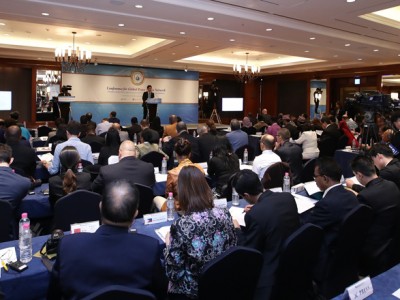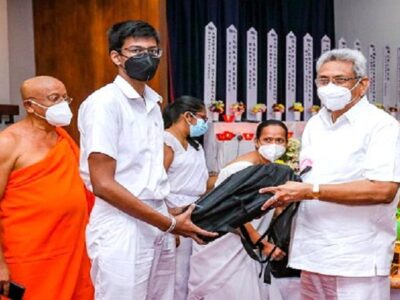(COLOMBO, LANKAPUVATH) –The International Rice Research Institute (IRRI) and Government of Sri Lanka today (18) inked a comprehensive work plan to advance Sri Lanka’s rice self-sufficiency goals through joint research for development projects in the country in the next five years.Jacqueline Hughes, IRRI’s Deputy Director General for Research and Sumith Nakandala, Additional Secretary for Bilateral Affairs of the Sri Lanka Ministry of Foreign Affairs served as the signatories.
The signing, held at the IRRI Los Banos, Laguna headquarters was witnessed by President Maithripala Sirisena himself and IRRI’s Director General Matthew Morell.The Sri Lanka-International Rice Research Institute 5-year Work Plan will compliment and help implement the new Sri Lanka National Plan for the Rice Sector. The plan is guided by 10 priority themes which will serve as the framework for joint collaborative research for development (R4D) pipeline projects aimed to enhance the resilience and viability of Sri Lanka’s national rice sector.
Sri Lanka’s rice sector has been challenged by the increasing impacts of climate change; stagnation in yield growth; high production and labour costs; low private sector investment; and poor mechanization and technology adoption among its farmers.In recent years, Sri Lanka has been badly affected by extreme weather events. In 2017, as a result of floods and droughts in different parts of Sri Lanka, there was a shortfall of 44 percent in the amount of rice needed by the country. This shortfall had to be met through imports of about 700,000 mt of rice.
While erratic country-wide climate conditions continue to take a toll on the country’s macroeconomic performance, Sri Lanka’s economy slightly grew by 3.9 percent in 2018 on the back of a recovery in the agriculture and services sectors, with this growth expected to continue in 2019.Beyond climate change, the work plan also targets current issues on agricultural productivity and sustainability. It is predicted that Sri Lanka needs to increase its rice production by 20 per cent over current levels by 2030 to remain self-sufficient.
Sirisena previously stated that he envisions a socio-economic growth driven by agriculture and sees advancements in the sector as a means to increase the export potential of Sri Lanka’s rice.In a normal year, Sri Lanka produces ca. 4.6 million mt annually with an average yield of 4.3 t/ha. This means the country’s current rice productivity level is less than half of its potential.
The new work plan will focus on developing high-yielding and climate resilient rice varieties with multiple tolerances to biotic and abiotic stresses, genomics-based breeding technologies, nutritious and value-added rice, capacity building and mechanization, among others. The project proponents also plan to promote more robust seed systems, and sustainable farm management practices.
“Improving the resilience and sustainability of Sri Lanka’s national rice economy through environmentally sustainable approaches is of utmost importance to address the complex challenges of population growth, agricultural production, and climate change in Sri Lanka. We are honoured to have Sri Lanka’s continued trust and we remain committed to supporting their efforts to restore rice self-sufficiency and attain food security,” Morell said.
By 2009, around 95 percent of Sri Lanka’s rice land had been planted with improved rice varieties. IRRI and Sri Lanka’s partnership, which dates back to the 1960s, started with rice varieties and germplasm exchange, capacity building, and technology transfer activities.
“We saw the positive effect of our long-term research collaboration and materials exchange to Sri Lanka when the country first gained rice self-sufficiency in 2010. This plan aims to improve and build on what we have learned from that to unlock the full potential of Sri Lanka’s rice sector and help the country regain this achievement once again.” Morell concludes.-IRRI




